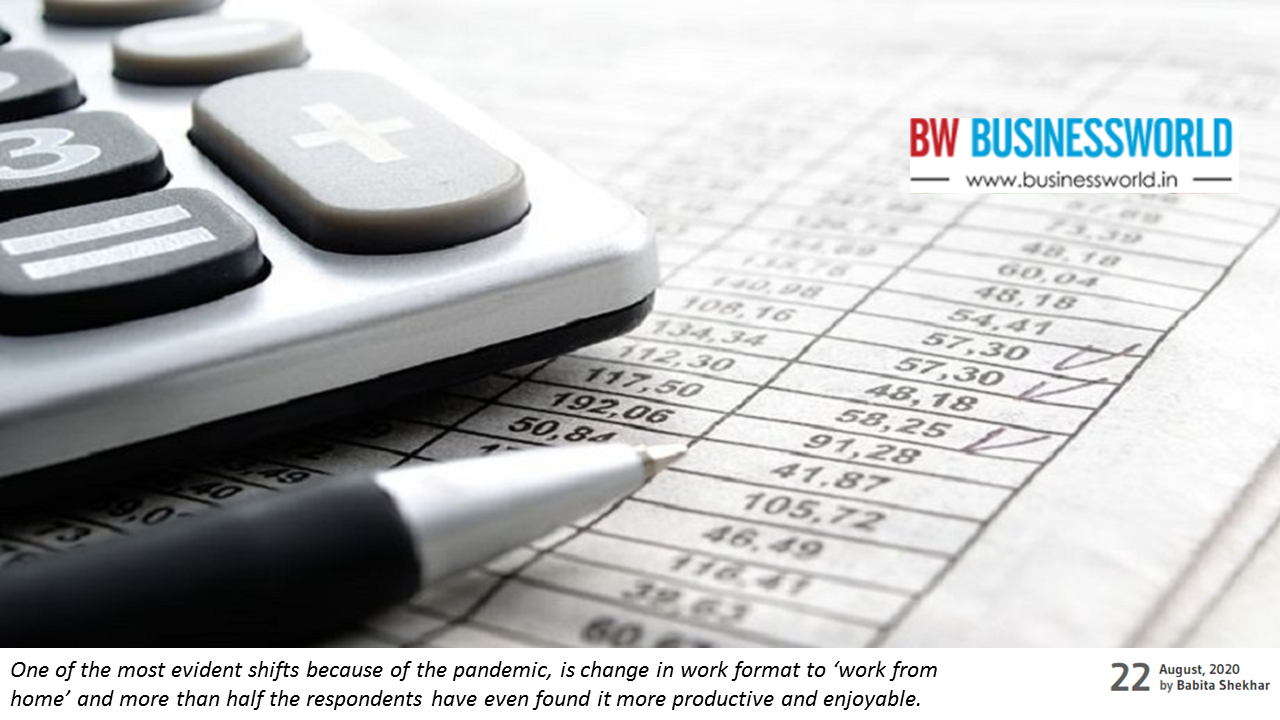
COVID-19 morphed into a full-blown pandemic, sweeping across the globe causing mayhem and devastation in its wake, in human life as well as in the life of humans. Spring 2020 saw the most unusual and unimagined circumstances – mass quarantines, lockdowns and what became the new buzz word, social distancing.
Two months after the specter of the coronavirus raised its ugly head, STEP Foundation, a section 8 company, founded with the spirit to empower people and communities, decided to undertake an online survey into the experience of living through this unusual and (hopefully) once in a life time experience – to delve a little deeper into the lessons learnt and the new perspectives that are emerging about our relationships, our work, and our environment.
The survey (sample N=270) revealed some interesting new behavioral practices emerging in response to changing demands of the ‘new normal’. As we went into quarantine all around the world and even complete lockdowns in some countries, the most impact was felt on our social life (Chart 1), as was to be expected.
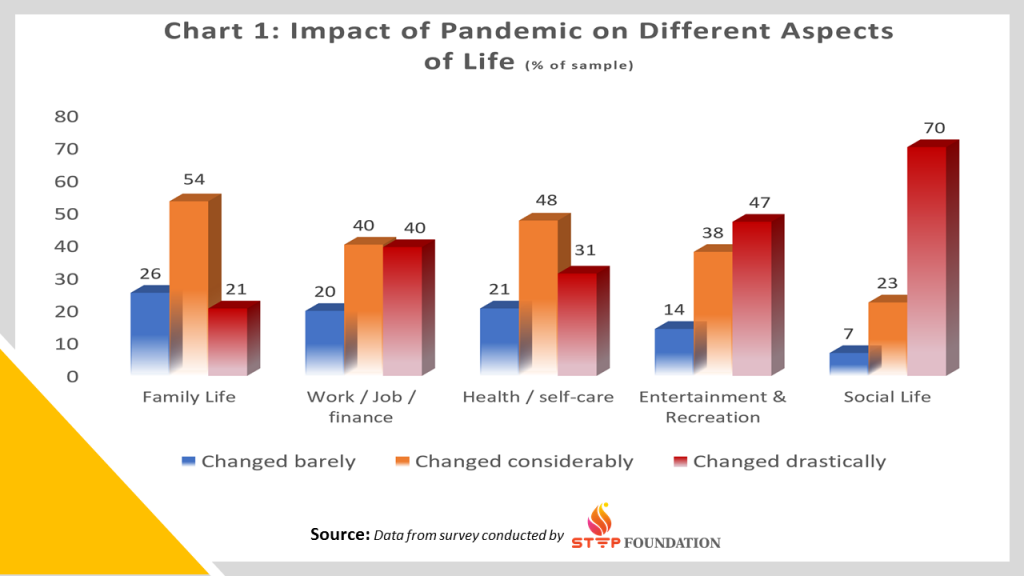
SOCIAL LIFE: Social interaction as we had known till then, changed drastically due to the lockdowns, for majority of the people. Entertainment and recreation activities, particularly outdoor activities, which play an important role in physical and mental wellness, dropped considerably, as reported by more than eighty percent of the respondents. Social media and various conferencing channels, which had already begun to play a significant role in our interactions pre-COVID, took center stage during the pandemic and emerged as the primary, if not the only way, of connecting during the ongoing crisis.
More than half of the respondents admitted to missing face to face interaction with their friends and family or feeling disconnected (Chart 2). Many found alternate ways to keep busy – some discovered new hobbies or ‘rediscovered’ old ones. Still others found more satisfying ways to keep connected by helping those in need, rather than restricting their reach to their known circle of friends and acquaintances. Some even admitted to feeling disconnected socially, but ‘connected with myself’.
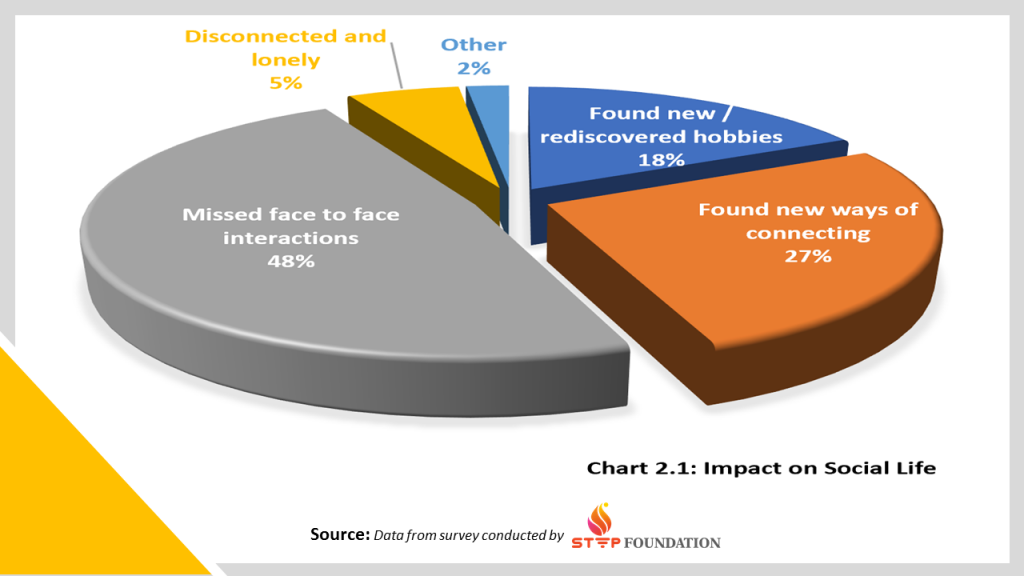
WORK AND INCOME: As economies around the world gear up to re-open after prolonged period of shutdowns, two
words are swirling overhead: second wave. The job market and work scenario has been the first and most obvious casualty of the first wave of the pandemic and has caused the economies around the world to shrink, resulting in job losses approximating 25 million, more than that of the 2008-09 Global financial crisis (ILO). In some countries, shorter working hours and ‘being employed but not working’ (e.g. workers on temporary leave) contributed significantly, while in others the main factor was people pushed into unemployment and inactivity (ILO Monitor, 2020). The UN body has also flagged large income losses to the tune of USD 3.4. trillion as countries went into an economic tailspin in the wake of the pandemic. The effect has been felt by respondents to this survey, some of whom have reported a change in income pre- and post-COVID (Chart 3).
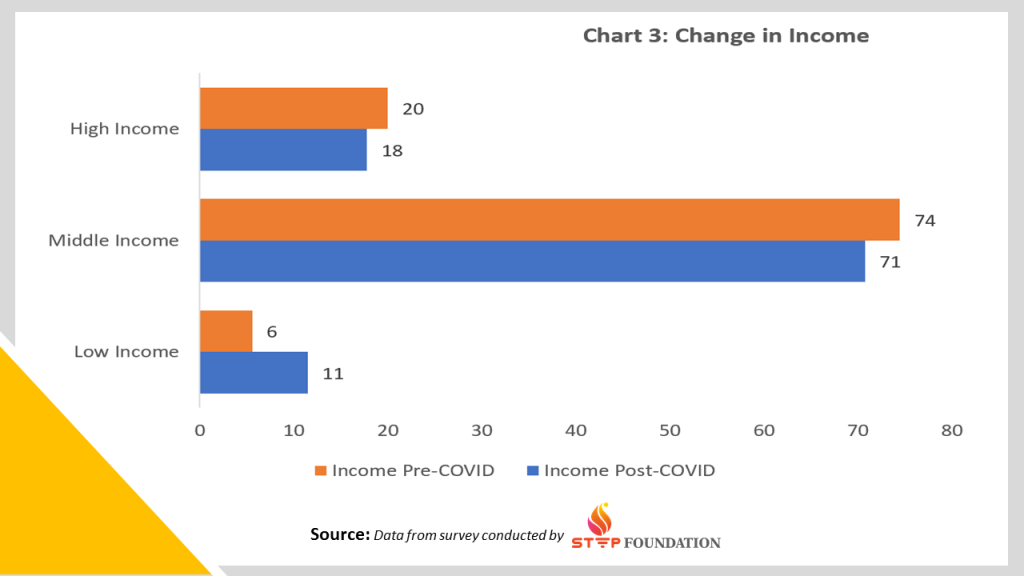
The impact is varied across different sectors: while many have been able to continue in work-from-home format, other sectors such as construction, hospitality, hairdressers, travel and tourism and many others have felt the brunt of the economic shrinkage. The hardest hit and the least discussed are the artists and entertainers, whose entire industry has been wiped out, with no timelines for their revival.
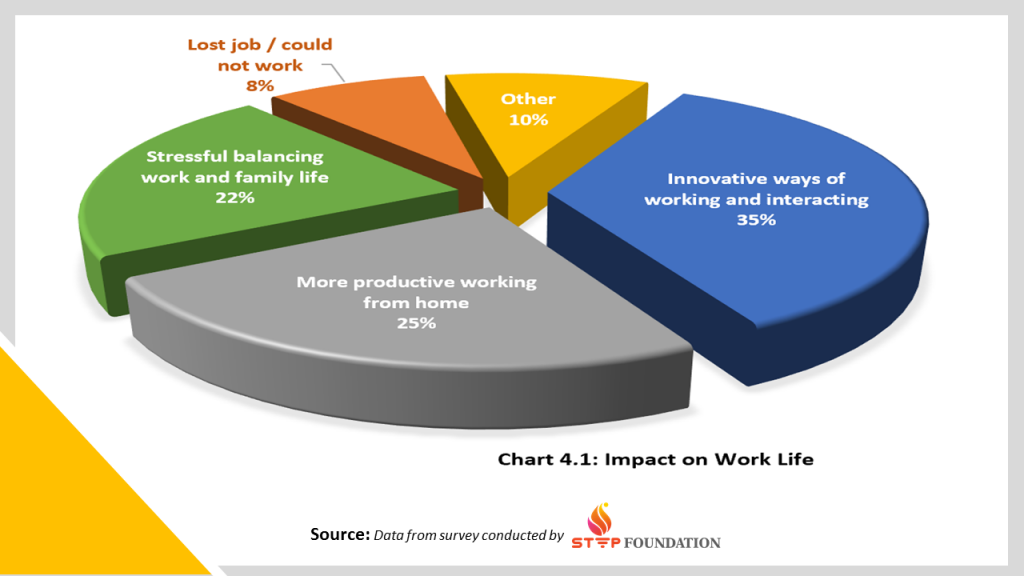
One of the most evident shifts because of the pandemic, is change in work format to ‘work from home’ and more than half the respondents have even found it more productive and enjoyable (Chart 4). However, around 8% of our sample group were unable to work and more than a fifth felt the stress of a new work culture, which has blurred the lines between work and family life.
FAMILY LIFE: Post-industrial world and the subsequent globalization have resulted in great social changes with the inevitable impact on family life. Succinctly described by American social psychologist K.J. Gergen as “the saturated family” its members are characterized by a multiplicity of relationships as they are exposed to myriad of values, lifestyles and personalities resulting in their lives scattering in intensified busyness. The home, no longer a refuge of harmony, serenity, and understanding, may become the site of confrontation between people of different ages and genders, who have widely divergent personal ideologies and social affiliations.
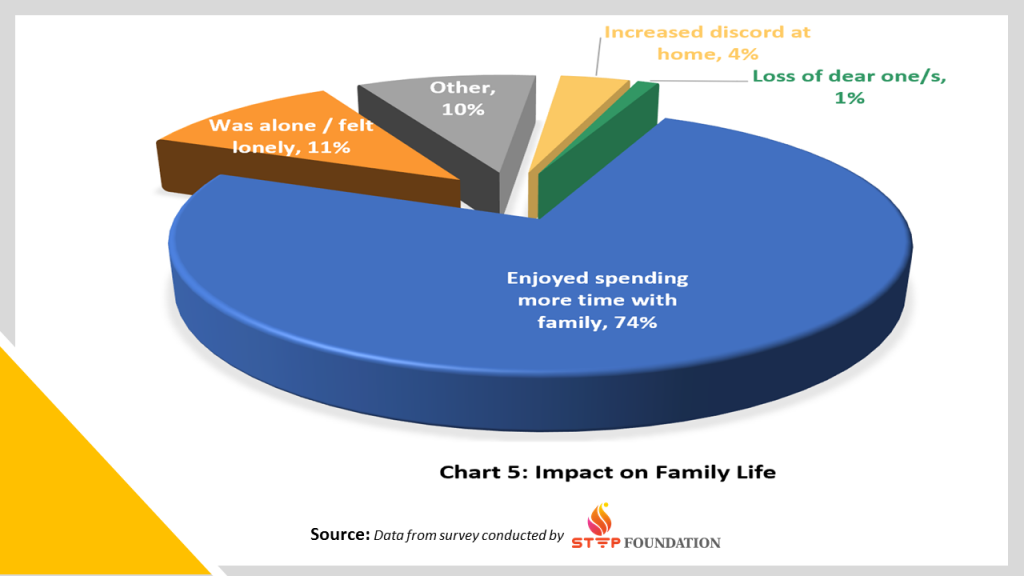
Our survey reveals that nearly three-quarters of our respondents re-discovered the joys of family life (Chart 5) and even for those who were left stranded without their families (more than 10%), the value and centricity of a family as a refuge from the external chaos, was brought to the fore. Other technology platforms whose intent is to connect family members and keep them in daily contact in an efficient, affordable, and rapid manner, also did not seem to fill the void of physical absence. Combined with their intent to continue with this change to more family time in the future (Chart 7), it may signify change in importance and role of family in the post-pandemic world.
HEALTH & SELF CARE: The word ‘safety’ has acquired a new meaning in the wake of rapid transmission of COVID-19, which has made social distancing and maintaining hygiene an imperative. The survey reveals a considerable shift in attitude towards health, with an overriding concern for safety (Chart 6). Masks and sanitizers have perhaps become the two most visible and ever- lasting images and tools of these times. As economies gradually reopen to enable the process of recovery, the dominating concern for most countries is centered around containing the spread and the possible ‘second wave’.
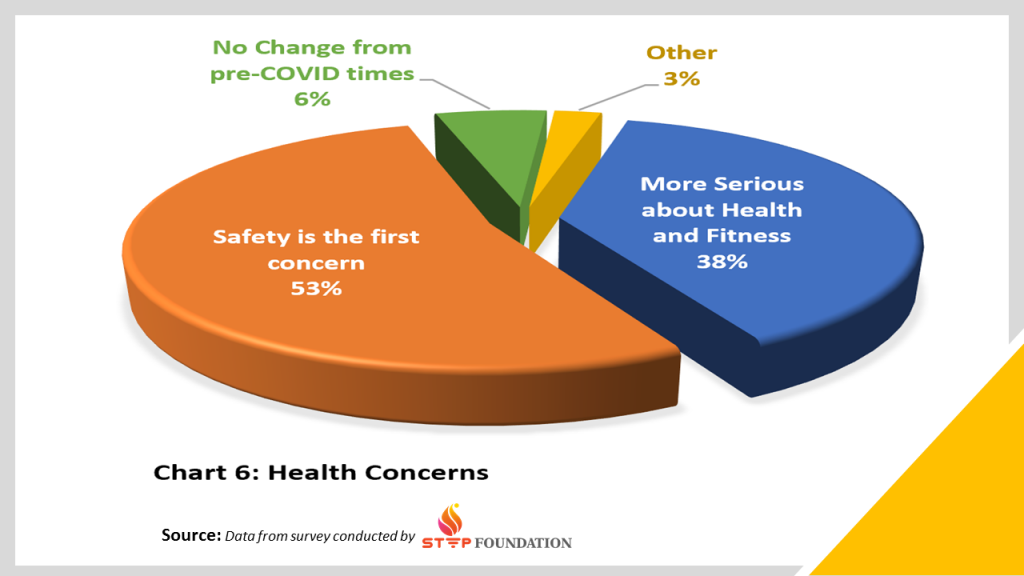
This concern around safety is likely to persist well beyond the immediate and may even become an integral part of the ‘new normal’. A third of the respondents to this survey have unequivocally stated that safety (including wearing masks, social distancing, washing hands and sanitizing) would be one of the things that they would carry on in the coming future (Chart 7) – signaling perhaps a behavioral shift.
Coronavirus exploded on the firmament and turned our world inside out. It forced us to change the way we live, the way we work and the way we interact with each other. But humans are resilient, and we are acquiring new survival skills, some of which may help us create a better world. Chart 7 reveals that we have begun to appreciate our families, our cleaner environment, and are coming to realize that we don’t have to be on the go all the time!
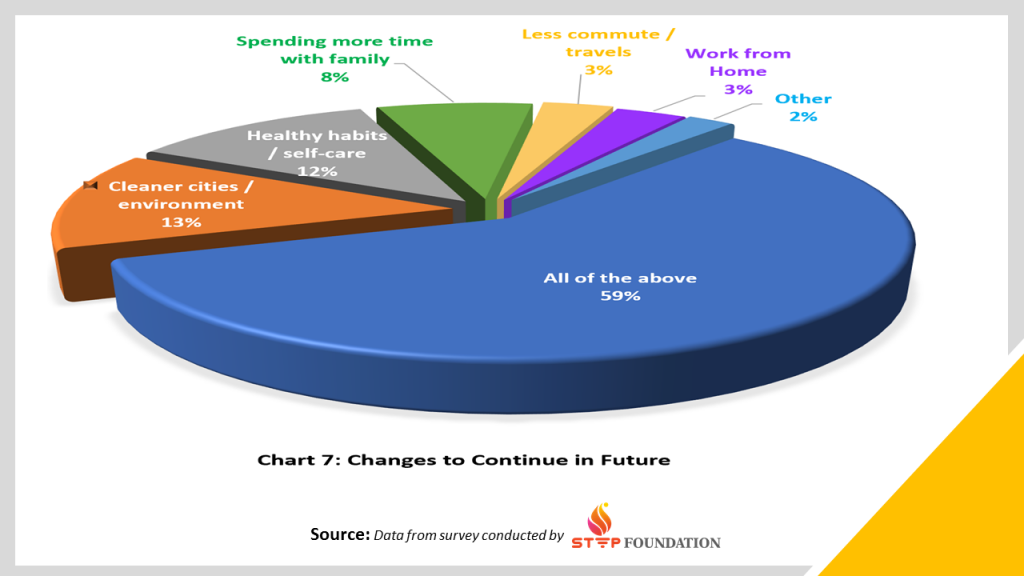
We even began to look within ourselves and a re-evaluated our lifestyles, our values, and our life goals. This introspection has thrown up new attitudes – gratitude, compassion, positivity, ‘live in the moment’, mindful of wastage, more tolerance, spirituality, ‘love more, appreciate more, complain less’, exploring self, ‘be more humble’, be more environmentally conscious – these are some that have emerged as the winners of this internal churning, as is also reflected in Chart 8. Some have found time and ways of giving back to the society, while others have avowed to give more time to charitable and social issues in the future.
An event of pandemic proportions, which threatens the very survival of the human race, is perhaps, giving rise to a collective conscience, which may be instrumental in creating a new world, once past the crisis. Change in attitude, coupled with many of the behavioral changes, as revealed by this survey, may bode well for the future as we rebuild a, hopefully, better tomorrow.
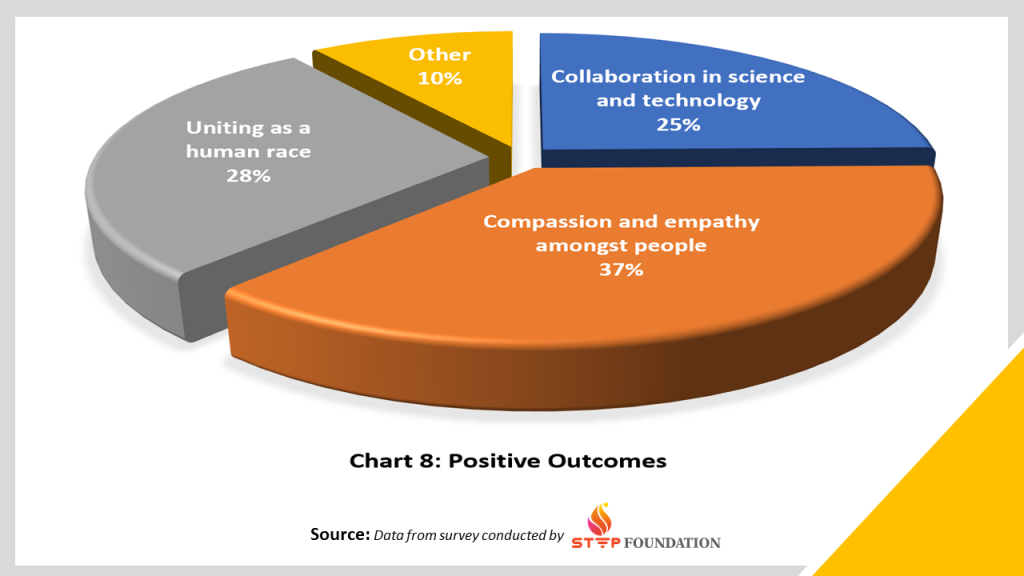
————-<><><>————-

Babita Shekhar:
Advisory Board Member of iE3 Innovations Pvt. Limited, a technology firm and Promoter of STEP Foundation, a section 8 company
Published in:


